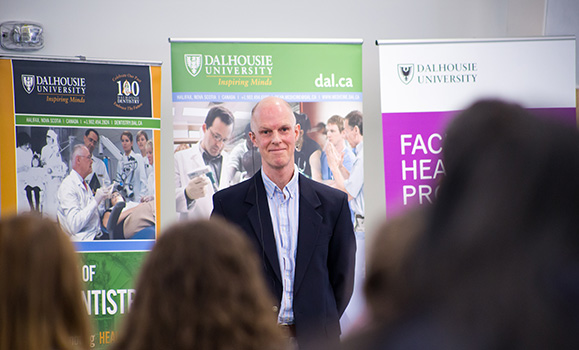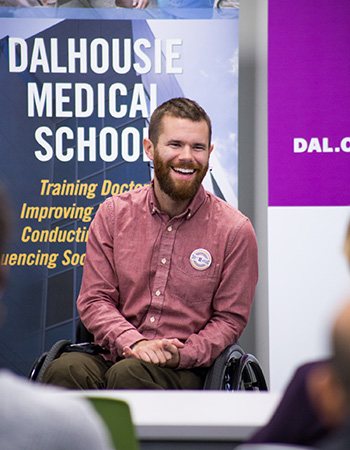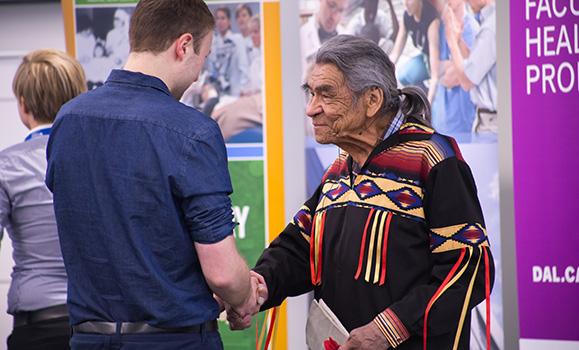“Eye-opening”, “inspiring,” “empowering”: that’s how participants described the National Health Sciences Students’ Association (NaHSSA) conference this past weekend.
Hosted for the first time at pilipili¬˛ª≠, the conference was organized by students in the Dalhousie chapter (DalHSSA). With a theme of ‚ÄúDiversity and Inclusion in Health Care: Diverse Populations, Diverse Professions and Inclusive, Collaborative Care‚Äù ‚Äî¬Ýfitting, given the conference‚Äôs location in Dal‚Äôs new Collaborative Health Education Building ‚Äî¬Ýattracted 150 students from across Canada in a wide range of health professions. ¬Ý
Presenters included staff from Halifax’s North End Community Health Centre, Scott Jones of the “Don’t Be Afraid” campaign, Michelle Patrick from Dalhousie’s Global Health Office, William Lahey of the Faculty of Law, and opening speaker John Ross, Dalhousie professor and former advisor on emergency care to the Nova Scotia government.

Dr. John Ross speaks with students.
With his talk titled “Challenging the Status Quo,” Dr. Ross didn’t disappoint, telling students that because of the widespread influence of huge, for-profit companies involved in everything from pharmaceuticals to telehealth, “change will come from the edges of health care.” He said too much money is still being spent “downstream” in Canada’s acute care system, rather than upstream to prevent the causes of illness, and offered several specific public policy prescriptions including requiring “…some rules around the marketing of unhealthy foods.”
He suggested students should take a broad view of the social factors that contribute to health and well-being: “The Halifax Central Library is an example of health care: it’s a place buzzing with people of all ages and classes, learning together.” He encouraged students to be part of positive change by viewing their future patients through the lens of “social determinants of health” such as income, education, job security, gender and race.
Community perspective
Staff from Halifax’s North End Community Health Centre spoke about the unique challenges they face serving a diverse and high-need population. The clinic started 45 years ago with a small group of health practitioners volunteering their time in a low-income neighbourhood where there were few doctors. Now the centre is funded by government with a staff of 50, including doctors, nurses, nurse practitioners, social workers, dieticians and others. The clinic provides a huge range of services such as pre-natal care, mobile mental health care, free dental care — thanks in part to Dalhousie students — and first aid for the homeless.
To respond to the special needs of the community, nurse practitioner Jac Atkinson told the students she often has to be creative. ‚ÄúI have clients who collect bottles in shopping carts (for a living). One client had a broken ankle but refused to get an x-ray.¬Ý I made a deal with him:¬Ý I fixed his shopping cart and he agreed to get an x-ray as a favour to me.‚Äù
 Michelle Patrick from Dalhousie’s Global Health Office provided tips for supporting diversity and inclusion. She also talked about the challenges faced by African Nova Scotian high school students in accessing higher education when a disproportionate number are on IPPs (Individual Program Plans), many of which don’t qualify them for university.
Michelle Patrick from Dalhousie’s Global Health Office provided tips for supporting diversity and inclusion. She also talked about the challenges faced by African Nova Scotian high school students in accessing higher education when a disproportionate number are on IPPs (Individual Program Plans), many of which don’t qualify them for university.
Activist Scott Jones (left) spoke about his ‚ÄúDon‚Äôt Be Afraid‚Äù campaign and about being the victim of a stabbing which left him in a wheelchair. Jones is a musician who was attacked by a stranger in 2013, targeted he believes, for being gay. And Dalhousie law professor Bill Lahey spoke about the need for legal and structural changes that strengthen patients‚Äô rights by requiring, among other things, self-regulating health professions to work together to handle patient complaints collaboratively, initiatives he has been leading in Nova Scotia. ¬Ý
Solving challenges
Along with the outstanding speakers, the conference included the National Health Care Team Challenge on Friday night, with five interprofessional student teams competing to develop the best patient care plan. The fictitious patient was a six-year-old girl, a recent immigrant from Syria. The University of Saskatchewan team (Matthias Muller, Physical Therapy; Carly Legault, Veterinary Medicine; Hallie MacLachan, Nursing; Lin Wang, Pharmacy; Amanda Geradts, Dietetics) won the competition, with a plan judged best at addressing cultural and language barriers while including the child’s family in decision-making.
The conference took several months of organizing by the Dalhousie Health Sciences Students‚Äô Association ‚Äî¬Ýalong with advisors from Dal and the IWK Health Centre ‚Äî and participants were overwhelmingly positive.

Alan Knockwood, Mi’kmaq elder, meets with students.
“It’s eye opening. This conference is about continuing the national conversation — it’s much more than lectures and speeches,” said Madeleine James, a Pharmacy student from the University of Waterloo.
“I liked the speakers a lot,” said Tujuanna Austin, a Health Sciences student from the University of Ottawa. “It’s good to hear from people who live and breathe interprofessionalism.”
‚ÄúI found Dr. Ross insightful and inspiring,‚Äù added Ankit Dhawan, a student in Kinetics at the University of Ottawa. ‚ÄúI especially liked his quote: ‚ÄòWhen people are floating downstream we send people out to save them ‚Äî that‚Äôs our health-care system. Instead we should go upstream and check to see if there‚Äôs someone throwing people in the river!‚Äô‚Äù ¬Ý
The presenters appeared equally buoyed by the conference theme and the engaged students. At one point, Dr. Anne Houstoun, of the North End Community Health Centre, looked out at the large room of students and said, “Thirty years ago when I was starting my career, you would never have seen a conference like this one — they just didn’t exist.”

